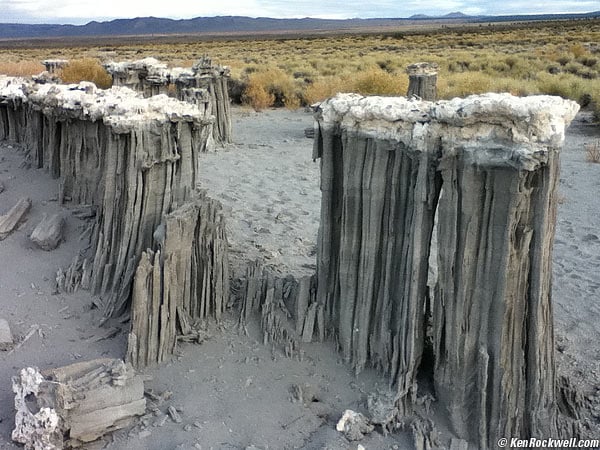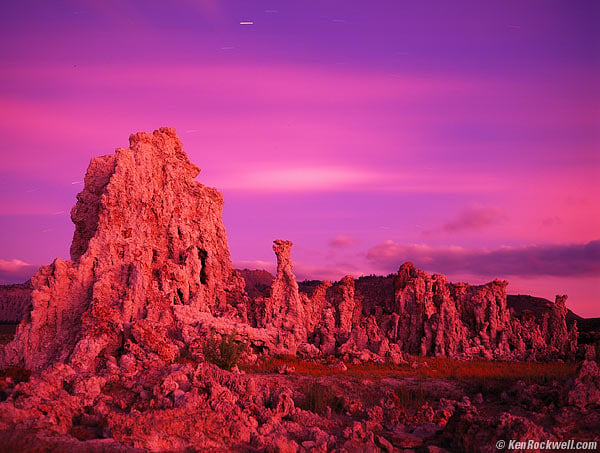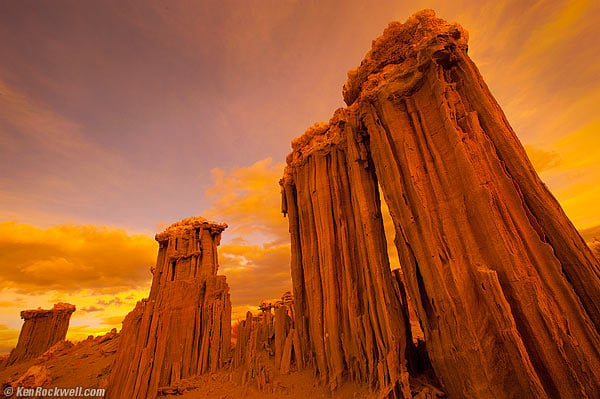Home Donate New Search Gallery How-To Books Links Workshops About Contact
It's Not About Your Camera
© 2010-2013 KenRockwell.com. All rights reserved.
Mono Lake, Saturday, 25 July 1993, snapped with a broken camera 15 minutes after my other photographer friends quit shooting and went to dinner. bigger. tech details.
If you must buy more cameras, my biggest source of support is when you use any of these links when you get anything, regardless of the country in which you live.It helps me keep adding to this free website when you get yours through these links — but I receive nothing for my efforts if you buy elsewhere. Thanks for your support! Ken.
May 2013 Better Pictures Nikon Canon Fuji LEICA All Reviews
See also Your Camera Doesn't Matter.
|
Adorama pays top dollar for your used gear. I use these stores. I can't vouch for ads below.
|
Kyrie
I made this snap in Mono Lake about 15 minutes after dark, after my other photographer friends had already packed it in, knowing the sunset show was over. It had been a long day of shooting, and they wanted to head to dinner.
I hoped that maybe something interesting would happen later, as had been happening with the atmospheric distortions brought about by the volcanic eruption of Mount Pinatubo.
I lucked out, and the sky actually turned this shade of magenta, while my pals had their dinner at The Charthouse in Mammoth a half hour before I did.
Memorable photos come from showing things worth remembering: things out of the ordinary.
Gloria Da capo
I made this shot with a broken camera.
Its focus was off, and it had been back a couple of times to the dealer who sold it to me used, the now-defunct Del's in Santa Barbara, and after this trip, I sent it back a third time. Del's gave up, scrapped the camera, and cheerfully returned my money.
How did I get this shot with an unrepairable camera, good only for parts?
Easy: the focus was off, but always by the same amount in the same direction. I shot tests before, and knew that if I nudged the focus ring on the camera the right amount in the right direction, that the focus could be corrected.
No big deal; I focused, moved the ring accordingly, shot this for four minutes on Velvia at f/4, and Bingo!, prize-winning shot.
Was any of this about my camera?
Of course not; it was all about staying out later than the rest of the herd, and being able to see and show something that few people rarely see.
Credo Da capo
It's not about your camera.
It's not about my camera.
It's all about you.
It's all about our ability to see.
It's all about our ability to new things, and to see old things in new ways.
It's all about our vision. It's never about your camera.
Sanctus Da capo
This becomes more clear as I teach more workshops. I'm trying to teach photography, while too many people are chasing down the wrong roads to good pictures by wasting time asking about their cameras, instead of asking about photography. Your JPG + RAW setting is irrelevant if you can't find a novel way to portray a subject.
Cameras are not photography any more than a pen is a novel, a brush is a painting or a golf ball is a tournament won.
The last time I had anyone talk about photography during a workshop was back in April 2010, when Richard Burns commented on Simon's use of line. They were talking about an image, not about gear. Gear isn't relevant to what's in the image.
Cameras are not like stereo equipment, cell phones, GPSs, FAX machines and scanners. While all this tends to come from the same stores and is purchased by the same sorts of people, all of this other consumer electronic equipment is used merely to reproduce the works of others, while cameras are tools used to create works out of nothing.
Benedictus Da capo
The best way to make the worst possible picture is to find a nice place, set up your tripod with the best possible camera, level the camera and carefully adjust everything to perfection, then photograph it with the sharpest possible lens with the highest possible dynamic range, resolution, color depth and gamut, all to get the most accurate and exact possible picture.
As Ansel Adams so truly observed, there's nothing worse than a sharp picture of a fuzzy idea:

Tioga Towers, 2010. Typical shot; a very accurate — and boring — rendition.
This is the snap I, and most people, make when getting to Tioga Towers after a grueling 11-mile hike across the Sierra. Look off the ledge, and snap the towers from across the gorge. It's impressive when you get there after a five-hour hike, but makes a dull photo, regardless of how much effort you put into that photo from the ledge.
Photography has nothing to do with reproducing things. A camera is a tool with which to create new works of art. Art is the expression of imagination. Imagination is how you see things differently from others.
Boring photos are boring when they are the same thing everyone else sees and shoots. Want to know the most boring pictures people send me? Thoughtless snaps of the woods, or their cats. Who cares? Show me images about which you've thought before snapping the shutter, and I mean thought about the image, not about your settings. Show me something I haven't seen before, or show it to me in a way I haven't seen.
Working the camera is easy; knowing how and where to take that camera, and when and where to point it, is the hard part.
It's never about the camera; it's all about taking whatever you've got, especially your phone's camera, looking around, and then taking the picture.
Once you find a picture worth taking, it's still never about the camera. It's always about knowing how to use that camera. The kind of camera is irrelevant.
Tioga Towers, 2010. Same thing, same time, different position, and an orange filter. bigger.
To make this snap, I had to climb down to the base of the towers, and look back up with a wide lens. I didn't want it gray, so I set 10,000 K white balance, and that wasn't warm enough, so I popped on an 85C (orange) filter, and along with the 10,000 K white balance, I forced this image to be as I saw it in my imagination.
Pens are all very different, but they have far less to do with what's written than what's written. Would you rather have a $10 check written out to you with a fancy pen, or a $10,000 check written with a BIC ballpoint?
It's exactly the same with photography: what's in the photograph is far more important than how the photograph was made.
The message matters, not the medium.
It's not about pixel size, color space or bit depth.
It's all about line, shape, form, color, balance, texture and tone. It's about new points-of-view, not about shooting at tripod or eye-level height.
Photography is all about what's in your frame, not what's in your bag.
It's all about moving yourself and seeing something worth seeing, in the strongest possible way. Get closer!
Agnus Dei Da capo
We do far better when we are worrying about our pictures and compositions, and not about our cameras. I mean, duh, if you're shooting digital, there's a screen on the back of your camera. You know if you got your picture immediately, and if it didn't take, you can try again. Double duh. The real issue is finding something interesting to photograph in an interesting way. The easy part is setting your camera's exposure and white balance.
When shooting, we should be paying attention to what's in our frames, and paying attention to the critical basics that make a strong image.
Dona nobis pacem Da capo
Better pictures come from staying out a little longer, walking a little farther, climbing a little higher, stooping a little lower, and then walking 360º around our intended subject to see things from the strongest and simplest point of view.
Please forget about the garbage not related to photography. Subpixel calculations, microgauss slopes, convolutional kernels, color coefficients, quantization matrices, and discrete cosine transforms have nothing to do with photography; leave them to the cubicle-bound engineers designing our cameras. They worry about this stuff so we don't have to.
Photography is all about our imaginations. It's all about showing us something new or in a new way, and then designing the elements in your frame for the strongest, simplest, best-balanced and most exciting composition.
It's not about your camera. It's about vision, seeing, and imagination. It's about playing like a kid to see what you can see from new places.
It's not about autofocus menus or exposure modes. It's all about line, texture, balance, emphasis, color, shape, curve and a million other things that actually make an image worthwhile.
Help me help you top
I support my growing family through this website, as crazy as it might seem.
The biggest help is when you use any of these links when you get anything, regardless of the country in which you live. It costs you nothing, and is this site's, and thus my family's, biggest source of support. These places have the best prices and service, which is why I've used them since before this website existed. I recommend them all personally.
If you find this page as helpful as a book you might have had to buy or a workshop you may have had to take, feel free to help me continue helping everyone.
If you've gotten your gear through one of my links or helped otherwise, you're family. It's great people like you who allow me to keep adding to this site full-time. Thanks!
If you haven't helped yet, please do, and consider helping me with a gift of $5.00.
As this page is copyrighted and formally registered, it is unlawful to make copies, especially in the form of printouts for personal use. If you wish to make a printout for personal use, you are granted one-time permission only if you PayPal me $5.00 per printout or part thereof. Thank you!
Thanks for reading!
Mr. & Mrs. Ken Rockwell, Ryan and Katie.
Home Donate New Search Gallery Reviews How-To Books Links Workshops About Contact




